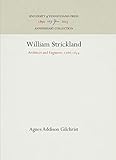William Strickland : Architect and Engineer, 1788-1854 / Agnes Addison Gilchrist.
Material type: TextSeries: Anniversary CollectionPublisher: Philadelphia : University of Pennsylvania Press, [2017]Copyright date: ©1950Edition: Reprint 2016Description: 1 online resource (168 p.) : 51 illusContent type:
TextSeries: Anniversary CollectionPublisher: Philadelphia : University of Pennsylvania Press, [2017]Copyright date: ©1950Edition: Reprint 2016Description: 1 online resource (168 p.) : 51 illusContent type: - 9781512820645
- 9781512819632
- 720.81
- NA737.S68 G5
- online - DeGruyter
- Issued also in print.
| Item type | Current library | Call number | URL | Status | Notes | Barcode | |
|---|---|---|---|---|---|---|---|
 eBook
eBook
|
Biblioteca "Angelicum" Pont. Univ. S.Tommaso d'Aquino Nuvola online | online - DeGruyter (Browse shelf(Opens below)) | Online access | Not for loan (Accesso limitato) | Accesso per gli utenti autorizzati / Access for authorized users | (dgr)9781512819632 |
Frontmatter -- Preface -- Table of Contents -- List of Plates -- Chapter I. Life -- Chapter II. Character -- Chapter III. Architectural Style -- Appendices -- A. A Chronologic, Bibliographic and Descriptive Catalogue of the Architectural and Engineering Work of William Strickland from 1804 to 1854 -- B. Contents of the Strickland Portfolio of Drawings in the Tennessee State Library -- C. Work As An Artist -- D. List Of Published Writings -- E. List Of Portraits Of William Strickland, His Father And His Wife -- F. Family, Residences, And Newspaper Obituaries -- Index
restricted access online access with authorization star
http://purl.org/coar/access_right/c_16ec
In Against Amnesia, Nancy J. Peterson addresses the ongoing postmodernist debate over the possibility and relevance of documentary and official histories. Drawing on Adrienne Rich's claim that women's literature and multicultural literature vigorously resist the amnesia and nostalgia that characterize mainstream North American culture, Peterson examines the struggles toward collective memory in a wealth of contemporary women's writing. Peterson's in-depth analyses of selected works by Louise Erdrich, Toni Morrison, Irena Klepfisz, Joy Kogawa, and other contemporary women writers illustrate the ways in which these authors recover and represent the historical memories attached to their racial/ethnic backgrounds. Their works probe traumatic moments in the marginalized histories of minority peoples, including Native American genocide and dispossession; African American slavery, migration, and displacement; the Holocaust; and the internment of people of Japanese ancestry during World War II. Peterson contends that these writers employ literary strategies that call attention to the gaps and silences of official histories. At the same time, these literary strategies allow the authors to narrate resonant counterhistories. Rejecting the playfully imaginative treatment of history found in typical postmodern novels, these contemporary women writers seek to reconstruct historical narratives in their texts and thereby reinvigorate historical memory in contemporary American culture.
Issued also in print.
Mode of access: Internet via World Wide Web.
In English.
Description based on online resource; title from PDF title page (publisher's Web site, viewed 30. Aug 2021)


